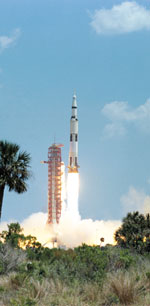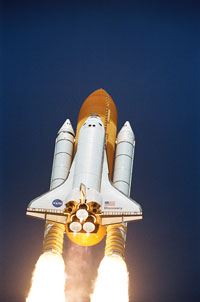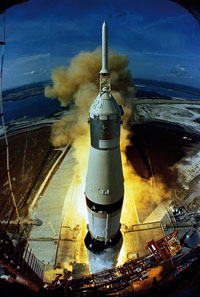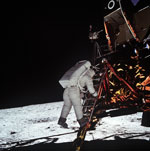Exploring the heavens
Jonathan Sarfati chats with NASA scientist Michael Tigges about outer space and Genesis

Michael Tigges (left) is a Senior Aerospace Engineer at NASA Johnson Space Center.1 He was the recipient of the NASA Exceptional Achievement Medal and Engineer of the Month award, and has published papers on landing of spacecraft on the moon and Mars, and the return of men safely to Earth. Born in Augsburg, Germany, he graduated cum laude (with honours) from the University of Georgia in physics, and earned a Master’s degree in physics from the Georgia Technical Institute of Technology. He is married to Brenda and they have a daughter, Tiffany, and son, Joshua. Most importantly, Michael is a Christian (Philippians 3:8). He had the blessing of being raised in a Christian home.
Uselessness of evolution

Like many Christians, Michael went through university training in biology, chemistry, and physics that was full of evolutionary concepts. And indeed, many claim that evolution is essential to scientific work. But Michael rejects this utterly. In fact he believes ‘that an unfettered evolutionary viewpoint is detrimental to understanding the fundamental truths of our universe.’
However, he cautions that ‘whether a scientist or engineer is an evolutionist or creationist will not affect the design or safety of a space mission.’ That is because the creation-evolution debate is a matter of origins science, which is based on reconstructing the past.
But the space mission depends on operational science. That is the main reason that evolution is irrelevant to science. Michael explains:
‘By operational science, I mean to say science that deals with the outcome of repeatable scientific experiments. For example, if I design a trajectory that returns men from the moon using the Earth’s atmosphere as a braking mechanism, then this approach can be simulated and tested and verified regardless of my “belief” in the age of the Earth or the mechanism of creation of life on this planet.
‘If you carry this train of thought through, there is very little operational science that is affected by the creation v. evolution dispute. Regardless of a decision in this matter, computers still operate, stars and planets maintain their orbits, and planes and rockets still fly.’
Evolutionary challenge to faith

Evolutionary indoctrination challenged Michael’s plain reading of Genesis. However, he said that ‘a seed of belief in the divine inspiration of Holy Scripture and the simple literal truth of the Genesis depiction of Creation always remained.’ But like many Christians, he was ‘quiet’ about that topic, because the ‘scientific literature was, and is, overwhelmingly in favour of evolutionary time scales.’
But he came to realize that creation was not a side issue, but that mixing Genesis with evolution really had baneful effects on one’s personal relationship with Jesus Christ.
Michael points out that Pontius Pilate sarcastically asked Jesus, ‘What is truth?’ (John 18:38). Yet Pilate was in the presence of the One who showed, ‘I am the way, the truth and the life; no man comes unto the Father but by me’ (John 14:6).
But if the Bible is not true about a young earth and six-day creation, then Jesus’ claim ‘can be tossed aside as irrelevant chatter from a man quoted within a scientifically disproven document.’ Indeed, he believes that this is the underlying reason for evolutionary indoctrination—‘to surreptitiously undermine pillars of biblical truth applicable to eternal salvation.’
Rejecting evolution

Michael is ‘greatly saddened to say that mainstream science has reached a point where absolutely no scientific credibility is placed on the Bible. There is total acceptance of a separation between science and Scripture.
This bias has been elevated to such an extent that scientists believing in the scientific credibility of Scripture are ostracized from mainstream scientific debate in that area.’
But Michael has studied the issue of origins, and finds evolution wanting. He testifies:
‘With all my scientific skill and depth of understanding, I have attempted to find a rationale to accept evolutionary postulates for the creation of life; and have failed.
‘Similarly, I have found it scientifically plausible and experimentally supportable to extrapolate current geologic conditions back in a short amount of time through cataclysmic events in support of a young-Earth. (That the framework for these two findings is provided within the text of a 3,000 year old document reinforces my belief in the scientific veracity of Scripture.)
‘In the end, there will be only one truth. And as a conscientious and credible scientist I must accept the findings of my research, even if it points to the existence of an intelligence that has directed the creation of current universal conditions of life and physics.

‘But I am encouraged by this finding. I am excited to learn of the distinction between animal and human life; I am excited that science supports the biblical teaching that the heavens were created by a loving God who decided, only a short time ago, to initiate conditions for a relationship with creatures He created in His likeness; and I am excited that, in spite of the marring of the originally perfect creation because of Adam’s sin, I, one of his fallen descendants, am permitted to make a personal decision within my short lifespan that will have eternal consequences.
‘I am also excited that I have an opportunity to write in this article, and perhaps in some small way encourage others to investigate a scientifically credible Bible-based truth, away from the alternate agenda and deceptions of mainstream science.’
Space exploration
Michael says that even as a child, he dreamed of becoming an astronaut. But ‘failed eyesight and health problems focused me on achieving my goal of venturing into space via mathematics and science.’ Still, he says:
‘I recall watching the first lunar landing with total fascination; and perceive now how that event provided a degree of motivation for me to seek a career investigating outer space. My career at NASA began just prior to the first Space Shuttle launch, so my first-hand recollection of the Apollo era was through television and radio.’
His Christian faith is also an inspiration to his work:
‘The heavens declare God’s glory in all ways. In all ways! From the moment I peered up into space as a child, I sensed the presence of God. When I see a Hubble Space Telescope image I react with fear and awe. Every mathematical equation I write to predict the path of space vehicles illuminates the miracle of precision designed into our world. Every Space Shuttle launch, I marvel at the ingenuity granted to man by God to accomplish that feat.

‘I am struck with awe by the incomprehensible scale of the galaxies and the power of that creation, and then humbled by my personal value to God, who sent His son to die for my sin.’
Michael carries his Bible with him to work each day. He says:
‘It is the Bible I received as a seven-year-old boy from my mother and father. Not a day passes that I do not meditate on the Holy Word of God, and sense the Divine providence of my Heavenly Father in all aspects of my personal and professional life.
‘I have been blessed with a good job. My responsibility is to determine safe ways of transporting humans through space. I understand the incredible dangers for those who venture into space. I use the sanctity of life as demanded by the God of Abraham, and Isaac, and Jacob to encourage me to work hard at my tasks.’
I asked him what advice he had for young people who are interested in research at NASA. He replied:
‘I would tell them to always seek the truth away from all prejudice, intimidation, and career or financial benefit. I pray that they will seek for guidance by studying the Bible, and to allow the truth of Scripture to be revealed to them. I would ask them to give Jesus first place in their life, and allow His truth to make sense and order out of the jumbled puzzle pieces of their life.’
Did men really land on the moon?

From time to time, television stations show ‘documentaries’ that supposedly demonstrate that the moon landings were a hoax. At Creation Ministries International, we would advise Christians that they should be pro-Bible, not anti-establishment for its own sake. So I asked Michael about this claim. He replied:
‘I too have read and heard claims from those who believe the entire Apollo mission was a hoax, generated by NASA to artificially “win” the race to the moon, for this and a myriad of other less specific reasons.1 My response to this attitude is similar to my response to people who question the veracity of the Bible and the life of Jesus Christ—events which also are in the distant but recorded past. I propose that the truth of an event is measured by more than just the number of eye-witness accounts or participants to an event, which both the lunar landing and the life of Christ have in numerous quantities. One impeccable witness is the late James Irwin, who was a staunch biblical creationist and walked on the moon.
‘There were other lasting consequences of those events in the lives of those to whom the legacy was passed down. Michael says, ‘Landing on the moon had a great impact on modern civilization that continues to this day through the marvels of material science, computers, satellites, and other technological “spin-offs”.’
Finally, Michael puts it into perspective:
‘However, as great as the Apollo event was, and as great the impact Apollo has had on humanity today, it pales in comparison to the truth of the impact of a single man on the lives of countless millions—a man whom we know as Jesus Christ and who lived, died and rose again about 2,000 years ago.
‘I sometimes believe that those who question the Apollo accomplishment are just being silly; or perhaps are in-grained scoffers and can do no more. But in the final analysis, I do not fear the Apollo doubters, for their doubt is only of worldly account. Who I really fear, and who do the greatest damage of eternal consequence, are those who deliberately doubt the certainty of Christ, and who attempt to convince others and lead them astray. I not only condemn those scoffers and “blind guides”, and accuse them of false doctrine, but I rebuke them and will to my dying day challenge their contorted perspective of the greatest of all historical events—the life, death, and resurrection of the Lord Jesus Christ.’
Reference
- See a point-by-point rebuttal, Fox TV and the Apollo Moon Hoax, badastronomy.com, accessed 2001. Return to text.
Note
- Viewpoints expressed here are personal and not necessarily those of NASA. Return to Text




Readers’ comments
Comments are automatically closed 14 days after publication.